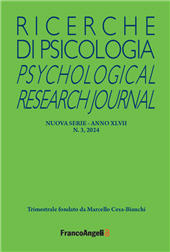Cracking the Code: examining Psychometric Rigor of the Provider Decision Process Assessment Instrument (PDPAI) among Residents' Trainees and Expert Physicians
31-55 p.
The realm of healthcare decision-making remains inadequately explored, specifically in assessing the psychometric characteristics of tools like the Provider Decision Process Assessment Instrument (PDPAI). This study aims to fill this void by examining decisional conflict among resident trainees and experienced consultant physicians. We approached a total of 347 physicians using a convenient sampling method from tertiary care hospitals. The analysis encompassed (I) factorial validity of PDPAI through confirmatory factor analysis (CFA) and evaluating the single group CFA models and (II) multigroup CFA models, (III) examining factorial invariance among residents' trainees and experienced physicians' groups, (IV) Rasch analysis assessing the individual item impact on the subdomains, (V) internal consistency (VI) convergent and discriminant validity.
The bifactor model adequately fit the data as all factor loadings (0.44-0.70) were statistically significant (0.05). The bifactor model supported the global construct or the sub-domains as suitable measurement models. The PDPAI showed invariance for use across two physician groups. Physicians encountered greatest difficulty in item "I was clear what treatment would be best for this patient." [MNSQ Infit/Outfit: 1.327/1.278] and found the easiest item "It was easy to identify all of the considerations that affect the decision" [0.902/0.869]. Adequate internal consistency was revealed through Cronbach and Omega coefficient values. Convergent and discriminant validity of PDPAI was supported by correlating with team decisionmaking questionnaire and compassion fatigue respectively. The PDPAI's validated cross-group invariance highlights it's applicability to a diverse range of physician groups, guiding tailored interventions. [Publisher's Text].
Forma parte de
Ricerche di psicologia : 3, 2024-
Artículos del mismo número (disponibles individualmente)
-
Información
Código DOI: 10.3280/rip2024oa18309
ISSN: 1972-5620
KEYWORDS
- Healthcare physicians, Factorial validity, Rasch analysis, Internal consistency, Convergent and discriminant validity ;.


